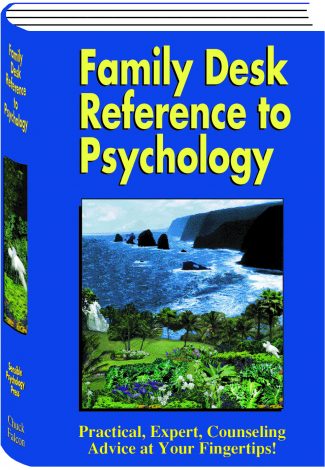Self-Help For All Common Problems

National Mental Health Association: “An easy-to-read reference … enlightened and comprehensive … very interesting and informative … terrific understanding, compassion, and clinical knowledge”
National Self-Help Clearinghouse: “a bountiful source of information … no-nonsense solutions to problems. Use it as a guide to better emotional health.”
American Mental Health Counselors Association: “an enjoyable and easy read … I would recommend it to consumers, students, clergy, teachers, and volunteers … particularly telling about the dangerously wide range of actual expertise and effectiveness of treatments”
Journal of Contemporary Psychotherapy: “Highly recommended … immensely beneficial … child rearing is discussed with utmost sensitivity and know-how … a tribute to the field of psychology … a balm for those who suffer.”
Science Books & Films: “ an ideal gift for young adults, newlyweds, young parents, or anyone facing change in their life. … Parental concerns from infancy throughout adolescence are addressed with clarity. … provides a balanced presentation of controversial and sensitive issues.”
International Academy of Behavioral Medicine, Counseling, and Psychotherapy: “remarkable … practical and useful … designed to be used by the layperson, but a useful guide for the practicing clinician.”
Covers Over 100 Personal Problems, Crises, Decisions, & Life Skills, Including:
Happiness * Judging Love, Relationships * Marriage * Addictions * Obesity * Depression * Anger * 33 Areas of Raising Children * Divorce * Insomnia * Abuse * Rape * Sexual Harassment * Sex Problems * Elder Care * Suicide * Grief, Trauma * Attention Deficit Disorder * Eating Disorders * Anxiety, Worry, Fear, Phobia * Pregnancy * Self-Esteem * Gambling * Getting over the Past * Nonverbal Communication * Assertiveness * Shyness * Nervous Habits * Dating
This self-help psychology book cross-references between related areas and general techniques, so deceptively short chapters add up to comprehensive instructions for each issue. Chapters end with more resources: the best books on each topic, national support groups (both phone numbers and Internet addresses), and hotline numbers.
Learn the behaviors linked to happiness and exactly what love is, in actions. Find out how to overcome a bad temper, weight problems, nervous habits, and insomnia. Decide if a friend or romance is good for you, if your partner would make a compatible husband or wife, if you are ready to become a parent, if you should get a divorce, or if you need professional help for your problems.
Understand how to effectively complain without causing anger, how to deal with someone else’s anger, improve your social life or find a romance, keep your marriage strong or improve or save it, make divorce easier on your children, and make custody decisions.
See how to get over the past, learn from your dreams, comfort a dying person, or how to help a suicidal friend. Learn the signs counselors use to determine the risk of suicide. Find out how to often avoid the need for disciplining your children, the best ways to deal with toilet training, thumb sucking, nail biting, stuttering, profanity, lying, stealing, and teenage problems, and how to protect children from sexual abuse without being sexually explicit.
Learn how to prevent rape, including date rape. Read the most effective responses to child abuse, woman abuse, sexual harassment, or rape. Surprisingly, going in a battered women’s shelter doesn’t really help unless the woman takes other steps to change things. Abusers’ counseling programs often don’t help at all and may actually increase your risk by leading to a false sense of security. Arresting the man may or may not help, depending on the type of man. Couple’s therapy without a clear focus on a partner’s violence is dangerous because discussing difficult and emotional issues can easily lead to violence.
The book contains up-to-date critiques of controversies in psychology, such as how counseling can cause multiple personality, electroshock therapy, and ineffective types of psychotherapy. And read the surprising facts about what does and doesn’t work in preventing violence, crime, and drug use, including how government policies cause much crime and waste massive resources on ineffective programs when we know other programs work much better. Problems and crises are opportunities to learn, change, and grow; this book will show you how.
